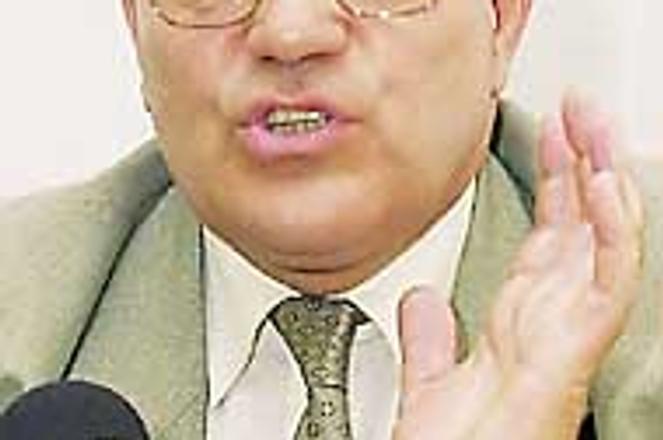KOŠICE region police chief Dunda explaining his case.photo: TASR
THE JUSTICE Ministry has stripped a Bratislava judge of his robes after the justice admitted to accepting an Sk100,000 ($2,300) bribe to levy a soft penalty on a man charged with armed robbery.
Only a few days after the case became public, another man came forward to say that the same judge, Igor Š., had requested Sk300,000 ($6,800) from him to deliver a favorable verdict.
Another case of alleged bribery against Košice region police corps boss Michal Dunda, in which two businessmen testified Dunda had charged them $1,000 in 1994 to recover stolen trucks, was shelved this past week because the statute of limitations had run out.
Along with health care, state administration, border offices and schools, Slovakia's judicial sector is among the areas the nation's citizens consider the most corrupt. The issue is not just a major one in the campaign leading up to late September elections, but has also attracted close attention from the Western alliances Slovakia hopes to be invited to join later this year.
The European Commission's (EC) annual progress reports on Slovakia have for years criticised the extent of corruption in the state, with this year's report expected to be no exception.
"In a society like ours, which in general is corrupt, we can hardly expect that one area of life will be completely clean of the vice," said Juraj Majchrák, head of the Slovak Association of Judges.
Local bar authorities have denounced the behaviour of the Bratislava judge, who admitted his guilt two days after he was arrested August 28 in a police sting operation, being handed the bribe by the plaintiff's father.
Despite such denunciations, the judiciary's ill-repute endures, with a December 2001 survey carried out by the Public Opinion Research Institute (ÚVVM) showing that nearly 70 per cent of respondents believed that without bribes it was impossible to secure justice at a Slovak court. Those who admitted to having bribed judges said they had given on average Sk50,000 ($1,100).
"Unfortunately this case does not add to the credibility of the Slovak judiciary, but I'm happy that things like these are coming to light," said Majchrák. "When this man is rightfully sentenced, it will be a sign for both the [corrupt] judges and the public that justices cannot do whatever they want, and that they too are punishable by law."
Majchrák added that it was "shocking" that the Igor Š. transaction had taken place inside the courthouse.
"That really shows that the man had no shame at all."
All of the nation's political parties agree that corruption needs to be vigorously addressed at the national level.
Representatives of the anti-corruption watch dog Transparency International Slovakia (TIS) said that while the Dzurinda cabinet had started the job of fighting corruption, the task would have to remain among the top priorities of the next cabinet arising from the September 20-21 general elections.
"We're now about mid-way towards eliminating corruption," said TIS head Emília Sičáková-Beblavá.
The Dzurinda cabinet won credit for approving several anti-corruption measures in the last four years, such as the Freedom of Access to Information Law, which allowed the public to request any unclassified documents from state bureaucrats.
Several changes to the judiciary have also drawn praise, such as the introduction of a computer-driven court management system, which promises to cut down on administration work and thus help reduce case backlogs, as well as ensure the random assignment of cases.
However, TIS and other anti-corruption bodies believe that the next cabinet must work harder to push through anti-corruption laws that would increase public control over members of parliament and top state officials (see major political parties' anti-corruption election programmes, this page).
Transparency International's 'Corruption Perception Index', an annual chart showing how prevalent corruption is perceived to be in various countries, ranked Slovakia 52nd out of 102 nations in 2002 alongside such countries as the Czech Republic, Morocco and Sri Lanka.
On a scale of 0-10 points, with 10 suggesting a corruption-free society and a score of less than two describing a nation with uncontrolled corruption, Slovakia's index was 3.7 for the second year in a row.
Onno Simons, counsellor with the EC delegation in Bratislava, said while he could not give details of the upcoming progress report on Slovakia, the country's efforts to fight corruption were being watched.
"Things like justice, home affairs and corruption will certainly be given a lot attention, and corruption is one of the main points we're looking at," Simons said.


